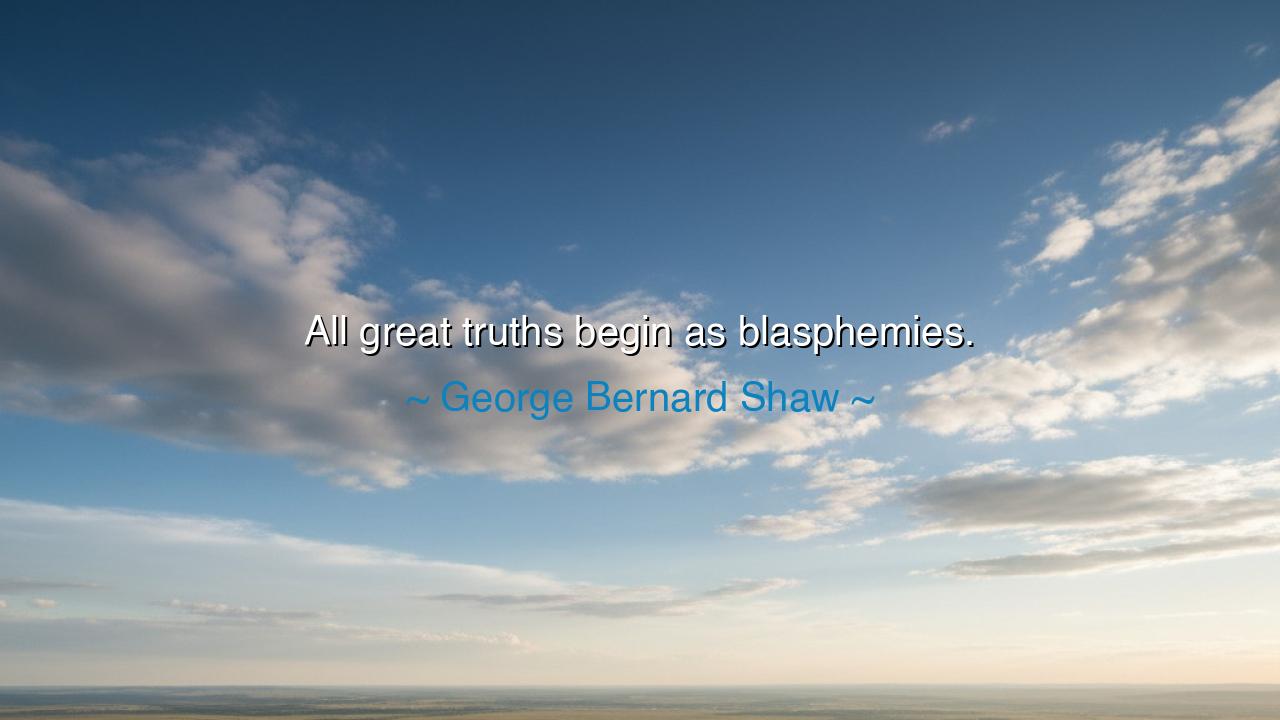
All great truths begin as blasphemies.






"All great truths begin as blasphemies." Thus declared George Bernard Shaw, the bold dramatist and prophet of paradox. In these words lies a fierce revelation: that the truths which later uplift humanity are often, at first, condemned as dangerous lies. For what is blasphemy but the challenge to what a society holds sacred? And yet, history shows that many of the ideas once scorned as heresies later became the very pillars of wisdom. The path of truth often begins in fire, and those who first speak it are burned by the scorn of their age.
The ancients themselves knew this. Was not Socrates accused of blasphemy for corrupting the youth and dishonoring the gods of Athens? His questions pierced the false certainties of his day, and for this, he drank the hemlock. Yet centuries later, he is revered as the father of philosophy, and his “blasphemy” has become eternal truth: that we must examine our lives, that unchallenged beliefs are not wisdom. Thus, what was once cursed has become holy.
History repeats this pattern. Galileo, standing before the tribunal of the Inquisition, declared that the earth revolved around the sun. His judges called it heresy, an insult to the sacred order of the universe. But his “blasphemy” was in fact a great truth, and though he was silenced in his day, the world now honors him as one of the liberators of human understanding. His story testifies to Shaw’s insight: the brightest lights are often mistaken for flames of destruction when they first appear.
Consider too the voices of reformers. Martin Luther nailed his theses to the church door, and his words were branded as blasphemy against divine authority. Yet his challenge gave birth to reformation, reshaping the spiritual and cultural life of Europe. Or think of the abolitionists, who cried out that slavery was a sin. At first, their voices were treated as madness, rebellion, even sacrilege against the economic and social gods of their time. But history proved them right, and their “blasphemies” became the truths of human dignity and freedom.
The lesson here is twofold. First, we must not be too quick to condemn what shocks us, for sometimes the most unsettling words carry the seed of truth. What seems to topple the sacred may actually be cleansing it. Second, those who dare to speak truth must be prepared for rejection, persecution, even death. For to reveal a great truth is to strike at the heart of lies that comfort the many. The reward of such courage is rarely given in the present age, but it shines across the ages to come.
Practically, this means cultivating discernment. Not all that calls itself rebellion is truth, but neither is all dissent falsehood. Listen carefully to those who are mocked or silenced, for often the cry of the outcast is the first whisper of a new dawn. And if you, yourself, glimpse a truth that others fear, do not shrink back into silence. Speak, even if your words are branded as blasphemy, for in time they may become the foundation of tomorrow’s wisdom.
So remember, children of tomorrow: all great truths begin as blasphemies. Do not be afraid of the fire, for fire refines. Do not be afraid of mockery, for mockery is the shield of fear. Stand in your truth, even when the world calls it heresy. For one day, the stones cast against you may become the cornerstones of a freer, wiser, more human world.






DATRAN DUC ANH
It’s intriguing to think that great truths might be viewed as blasphemies at first, especially when they go against the grain of accepted norms. Shaw's quote brings up the idea of innovation and how it often comes with a price: the initial rejection. But could this rejection ever be a sign that the truth is not actually right, or is it just a sign that it’s ahead of its time? At what point does society come to accept these 'blasphemous' ideas as truths?
NHDo Nguyen Hoang
Shaw’s quote seems to speak to the idea of truth as something that breaks boundaries and disrupts the status quo. But it makes me wonder—does the perception of a truth change over time, or is it always perceived as blasphemous initially? What does it say about human nature that we are often so resistant to ideas that challenge our deeply held beliefs? Is it fear of change, or is it simply the difficulty of accepting new ideas?
8STruong Gia Bao 8/1 stt6
This quote challenges the notion of how society treats new ideas. It's almost like Shaw is suggesting that change is inherently uncomfortable for people, especially when it challenges deeply held beliefs. But can something be 'truth' if it is met with resistance and opposition? Or does the true value of an idea come from its ability to withstand criticism and eventually be accepted, no matter how much it was opposed at first?
MPnguyen minh phuong
I find it fascinating that Shaw suggests all great truths start as blasphemies. It makes me think about how the idea of 'truth' is so often tied to the prevailing beliefs of a time. When new truths challenge those beliefs, they are often seen as dangerous or controversial. But is it always the case that the truth starts as a blasphemy? Or are there moments when the truth is just more readily accepted, without this backlash?
GDGold D.dragon
Shaw’s quote really makes me think about how groundbreaking ideas are often met with resistance at first. It’s true that many revolutionary truths were once considered radical or even blasphemous by the society of their time. But how do we determine when something is truly a new truth versus when it's just a rebellious idea with no real substance? Could this resistance be a necessary part of progress, or does it sometimes hold back the truth?